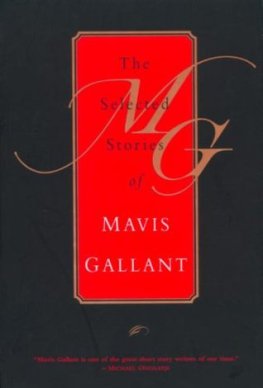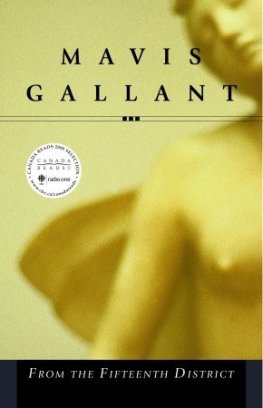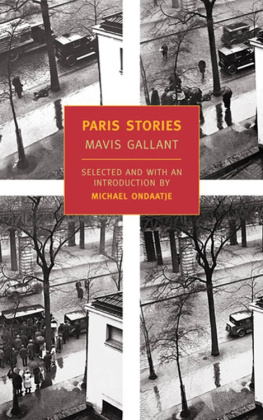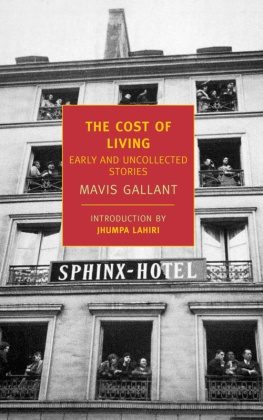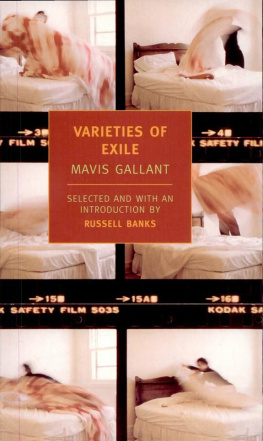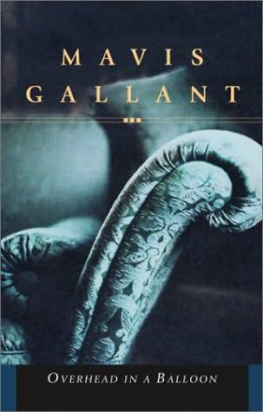NEW YORK REVIEW BOOKS
CLASSICS
VARIETIES OF EXILE
MAVIS GALLANT was born in Montreal and worked as a journalist at The Standard before moving to Europe to devote herself to writing fiction. After traveling extensively she settled in Paris, where she still resides. Her stories first appeared in The New Yorker in 1951. Paris Stories, selected and introduced by Michael Ondaatje, was published by New York Review Books Classics in 2002. Varieties of Exile is her fourteenth book to appear in this country.
RUSSELL BANKS is a novelist and short story writer. His most recent works are Cloudsplitter, a novel, and The Angel on the Roof: New and Selected Stories. He is president of the International Parliament of Writers and a member of the American Academy of Arts and Letters. He lives in upstate New York.
THE FENTON CHILD
I N A LONG room filled with cots and undesired infants, Nora Abbott had her first sight of Neil, who belonged to Mr. and Mrs. Boyd Fenton. The child was three months old but weedy for his age, with the face of an old man who has lost touch with his surroundings. The coarse, worn, over-sized gown and socks the nuns had got him up in looked none too fresh. Four large safety pins held in place a chafing and voluminous diaper. His bedding the whole nursery, in fact smelled of ammonia and carbolic soap and in some way of distress.
Nora was seventeen and still did not know whether she liked children or saw them as part of a Catholic womans fate. If they had to come along, then let them be clear-eyed and talcum-scented, affectionate and quick to learn. The eyes of the Fenton baby were opaquely gray, so rigidly focused that she said to herself, He is blind. They never warned me. But as she bent close, wondering if his gaze might alter, the combs at her temples slipped loose and she saw him take notice of the waves of dark hair that fell and enclosed him. So, he perceived things. For the rest, he remained as before, as still as a doll, with both hands folded tight.
Like a doll, yes, but not an attractive one: No little girl would have been glad to find him under a Christmas tree. The thought of a rebuffed and neglected toy touched Nora deeply. She lifted him from his cot, expecting though not precisely the limpness of a plush or woolly animal: a lamb, say. But he was braced and resistant, a wooden soldier, every inch of him tense. She placed him against her shoulder, her cheek to his head, saying, There you go. Youre just grand. Youre a grand little boy. Except for a fringe of down around his forehead, he was perfectly bald. He must have spent his entire life, all three months of it, flat on his back with his hair rubbing off on the pillow.
In a narrow aisle between rows of beds, Mr. Fenton and a French-Canadian doctor stood at ease. Actually, Dr. Alex Marchand was a pal from Mr. Fentons Montreal regiment. What they had in common was the recent war and the Italian campaign. Mr. Fenton appeared satisfied with the state and condition of his son. (With her free hand Nora pulled back her hair so he could see the baby entirely.) The men seemed to take no notice of the rest of the room: the sixty-odd puny infants, the heavily pregnant girl of about fourteen, waxing the floor on her hands and knees, or the nun standing by, watching hard to be sure they did not make off with the wrong child. The pregnant girls hair had been cropped to the skull. She was dressed in a dun-colored uniform with long sleeves and prickly-looking black stockings. She never once looked up.
Although this was a hot and humid morning in late summer, real Montreal weather, the air a heavy vapor, the men wore three-piece dark suits, vest and all, and looked thoroughly formal and buttoned up. The doctor carried a panama hat. Mr. Fenton had stuck a carnation in his lapel, broken off from a bunch he had presented to the Mother Superior downstairs, a few minutes before. His slightly rash approach to new people seemed to appeal. Greeting him, the nuns had been all smiles, accepting without shadow his alien presence, his confident ignorance of French, his male sins lightly borne. The liquor on his breath was enough to knock the Mother Superior off her feet (he was steady on his) but she may have taken it to be part of the natural aura of men.
Well, Nora! said Mr. Fenton, a lot louder than he needed to be. Youve got your baby.
What did he mean? A trained nanny was supposed to be on her way over from England. Nora was filling in, as a favor; that was all. He behaved as if they had known each other for years, had even suggested she call him Boyd. (She had pretended not to hear.) His buoyant nature seemed to require a sort of fake complicity or comradeship from women, on short notice. It was his need, not Noras, and in her mind she became all-denying. She was helping out because her father, who knew Mr. Fenton, had asked if she would, but nothing more. Mr. Fenton was in his late twenties, a married man, a father, some sort of Protestant another race.
Luckily, neither the girl in uniform nor the attendant nun seemed to know English. They might otherwise have supposed Nora to be Neils mother. She could not have been the mother of anyone. She had never let a man anywhere near. If ever she did, if ever she felt ready, he would be nothing like Mr. Fenton typical Anglo-Montreal gladhander, the kind who said Great to see you! and a minute later for-got you were alive. She still had no image of an accept-able lover (which meant husband) but rather of the kind she meant to avoid. For the moment, it took in just about every type and class. What her mother called having relations was a source of dirty stories for men and disgrace for girls. It brought bad luck down even on married couples unless, like the Fentons, they happened to be well-off and knew how to avoid accidents and had no religious barrier that kept them from using their knowledge. When a mistake did occur namely, Neil they werent strapped for cash or extra space. Yet they were helpless in some other way, could not tend to an infant without outside assistance, and for that reason had left Neil to founder among castaways for his first twelve weeks.
So Nora reasoned, gently stroking the babys back. She wondered if he had managed to capture her thoughts. Apparently infants came into the world with a gift for mind reading, an instinct that faded once they began to grasp the meaning of words. She had been assured it was true by her late Aunt Rosalie, a mother of four. The time had come to take him out of this sour place, see him fed, washed, put into new clothes and a clean bed. But the two men seemed like guests at a disastrous party, unable to get away, rooted in place by a purely social wish to seem agreeable.
How sappy they both look, ran Noras thoughts. As sappy as a couple of tenors. (Sappy-looking as a tenor was an expression of her fathers.) Ill never get married. Who wants to look at some sappy face the whole day.
As though he had heard every silent word and wished to prove he could be lively and attentive, the doctor looked all around the room, for the first time, and remarked, Some of these children, it would be better for everybody if they died at birth. His English was exact and almost without accent, but had the singsong cadence of French Montreal. It came out, Most of these children, it would be better for everybody... Nora held a low opinion of that particular lilt. She had been raised in two languages. To get Nora to answer in French, particularly after she had started attending an English high school, her mother would pretend not to understand English. I may not be one of your intellectuals, Nora decided (an assurance her father gave freely), but I sound English in English and French in French. She knew it was wrong of her to criticize an educated man such as Dr. Marchand, but he had said a terrible thing. It would have sounded bad spoken heedfully by the King himself. (The King, that August morning, was still George the Sixth.)
Next page


